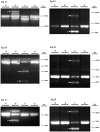Classifying MLH1 and MSH2 variants using bioinformatic prediction, splicing assays, segregation, and tumor characteristics
- PMID: 19267393
- PMCID: PMC2707453
- DOI: 10.1002/humu.20936
Classifying MLH1 and MSH2 variants using bioinformatic prediction, splicing assays, segregation, and tumor characteristics
Abstract
Reliable methods for predicting functional consequences of variants in disease genes would be beneficial in the clinical setting. This study was undertaken to predict, and confirm in vitro, splicing aberrations associated with mismatch repair (MMR) variants identified in familial colon cancer patients. Six programs were used to predict the effect of 13 MLH1 and 6 MSH2 gene variants on pre-mRNA splicing. mRNA from cycloheximide-treated lymphoblastoid cell lines of variant carriers was screened for splicing aberrations. Tumors of variant carriers were tested for microsatellite instability and MMR protein expression. Variant segregation in families was assessed using Bayes factor causality analysis. Amino acid alterations were examined for evolutionary conservation and physicochemical properties. Splicing aberrations were detected for 10 variants, including a frameshift as a minor cDNA product, and altered ratio of known alternate splice products. Loss of splice sites was well predicted by splice-site prediction programs SpliceSiteFinder (90%) and NNSPLICE (90%), but consequence of splice site loss was less accurately predicted. No aberrations correlated with ESE predictions for the nine exonic variants studied. Seven of eight missense variants had normal splicing (88%), but only one was a substitution considered neutral from evolutionary/physicochemical analysis. Combined with information from tumor and segregation analysis, and literature review, 16 of 19 variants were considered clinically relevant. Bioinformatic tools for prediction of splicing aberrations need improvement before use without supporting studies to assess variant pathogenicity. Classification of mismatch repair gene variants is assisted by a comprehensive approach that includes in vitro, tumor pathology, clinical, and evolutionary conservation data.
Copyright 2009 Wiley-Liss, Inc.
Figures

References
-
- Aretz S, Uhlhaas S, Sun Y, Pagenstecher C, Mangold E, Caspari R, Moslein G, Schulmann K, Propping P, Friedl W. Familial adenomatous polyposis: aberrant splicing due to missense or silent mutations in the APC gene. Hum Mutat. 2004;24(5):370–80. - PubMed
-
- Auclair J, Busine MP, Navarro C, Ruano E, Montmain G, Desseigne F, Saurin JC, Lasset C, Bonadona V, Giraud S, et al. Systematic mRNA analysis for the effect of MLH1 and MSH2 missense and silent mutations on aberrant splicing. Hum Mutat. 2006;27(2):145–54. - PubMed
-
- Caldes T, Godino J, Sanchez A, Corbacho C, De la Hoya M, Lopez Asenjo J, Saez C, Sanz J, Benito M, Ramon YCS, et al. Immunohistochemistry and microsatellite instability testing for selecting MLH1, MSH2 and MSH6 mutation carriers in hereditary non-polyposis colorectal cancer. Oncol Rep. 2004;12(3):621–9. - PubMed
-
- Cartegni L, Krainer AR. Disruption of an SF2/ASF-dependent exonic splicing enhancer in SMN2 causes spinal muscular atrophy in the absence of SMN1. Nat Genet. 2002;30(4):377–84. - PubMed
Publication types
MeSH terms
Substances
Grants and funding
LinkOut - more resources
Full Text Sources

